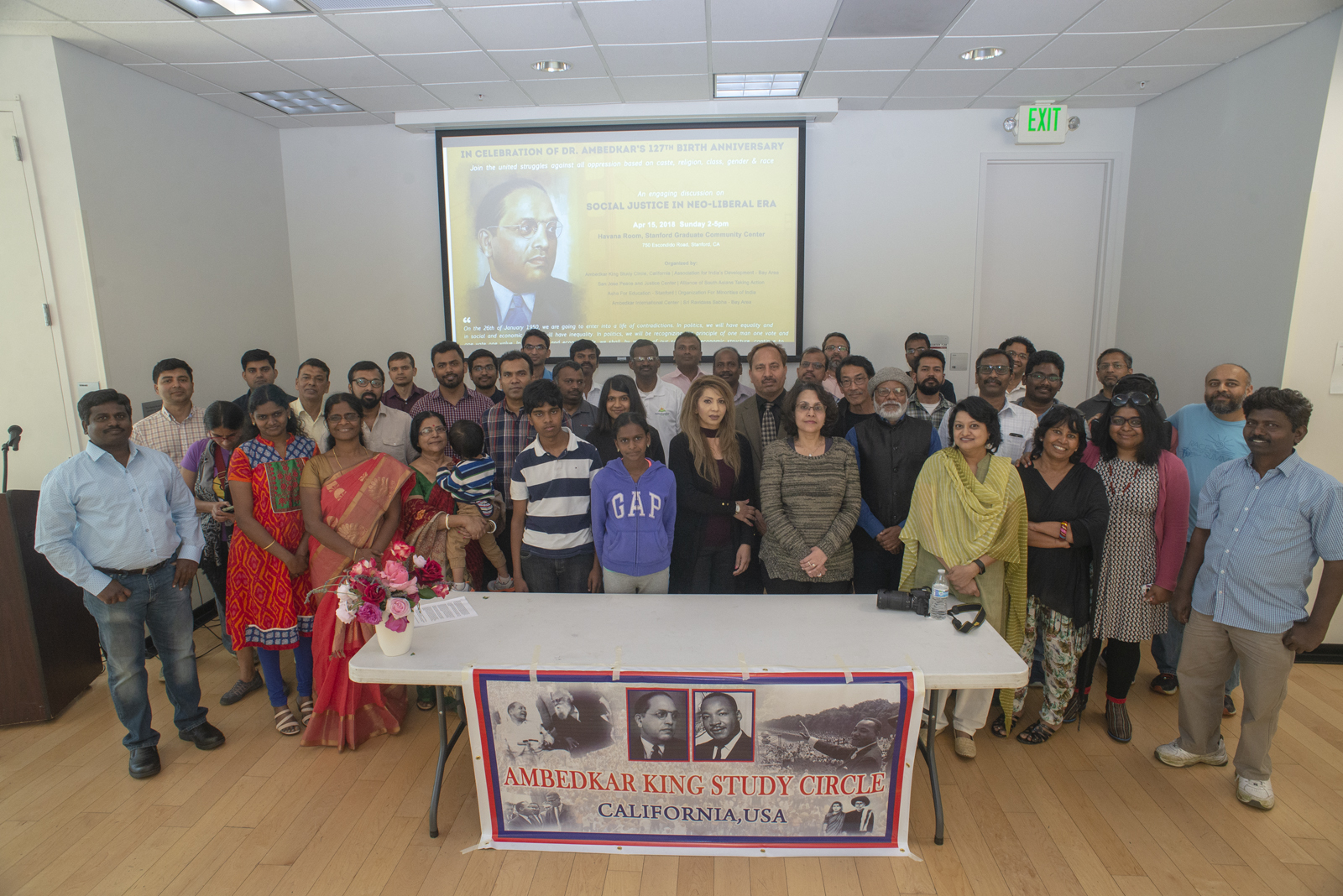“Change in the social system and need of a better future”: Ambedkar’s 127th Birth anniversary celebrated in California

By Sidharth Dhamma
On Sunday, April 15, 2018, various progressive organizations from Silicon Valley, San Francisco Bay Area, USA organized a program to commemorate Dr. Babasaheb Ambedkar’s 127th birthday in Havana room of Stanford University Campus. The theme of the commemoration was “Social Justice in Neoliberal Era.”
Kanakarajan, a member of Ambedkar King Study Circle (AKSC), moderated the program which started with a brief video introduction of Ambedkar’s work and his life. Mr.Pavan of Association for India (AID) co-hosted the event.
Participants observed a moment of silence for victims of rape in Jammu and Kashmir and Uttar Pradesh, and for those 11 Dalits killed in violence unleashed by the Hindutva forces during the April 2, Bharat Bandh as a protest to Indian supreme court’s ruling to dilute SC/ST Prevention of Atrocities Act.
Karthikeyan, the secretary at AKSC, talked about ‘Contradictions’ i.e. contradiction in social and economic inequality in the new liberal era. He quoted Ambedkar’s statement - “In politics, we’ll have equality, but in social life, we’ll have inequality, One man one vote, one value, but very structure of social economic condition, we’ll continue to deny one man one vote”.
Karthikeyan expanded the Ambedkar’s idea of social justice from “Annihilation of Caste” and his party i.e. Scheduled Caste Federation (SCF) program, “Dr. Ambedkar writes in Annihilation of Caste that democracy is associative living, respect, and reverence to the fellow human. In SCF’s program, Dr. Ambedkar writes that we should put an end to exploitation man by man and class by class.”
Karthikeyan reiterated Ambedkar’s warning, “How long we’ll continue to live a social economic contradiction, we must remove the contradictions sooner else those who suffer from inequality will blow up very structure of democracy.”
Elancheran, an executive member of AKSC, shared his detailed study on Hindu Code Bill which Ambedkar introduced in the Constituent Assembly on April 11, 1947 and how it is dragged on for four years, in independent India parliament then killed and died there “Unwept and Unsung”.
The Hindu Code Bill was killed by the so-called upper caste members of both in the constituent assembly and in the parliament. Elancharan put a very strong and valid argument that how many women from the privileged section of Indian society aware that Ambedkar fought for their property rights especially “inheritance rights of daughters and wives”, right to divorce under certain extreme conditions, abolishing polygamy law at all.
Elancheran made a humble appeal to the audience, especially Indian women, to go through the Hindu Code Bill in general and start the discussion on the same in particular. The fact must be noted that Ambedkar resigned from Nehru’s cabinet in September 1951 and said, “In regard to this Bill I have been made to go through the greatest mental torture.”
Pieter Friedric of Organization for Minorities of India(OFMI) talked about the argument on policies and beliefs between Gandhi and Ambedkar on Caste issue.
Sonali, from the Association for India as a Silicon Valley Techie, narrated her own personal experience. That’s how although she was born in middle class, yet how to begin born in so-called upper caste family gave privileges and advantage to get ahead of lower caste and untouchable people of India. She explained how the starting point one’s life is very important for molding and shaping an individual.
Sharat of SJPnJC started his argument with comparing Sun Yat-sen of China and Ambedkar of India. He walked through the audience through Yat-sen’s three principles namely nationalism, democracy and people’s livelihood (also as known as “Just Society”).
He drew the parallel between Yat-sen’s democracy and ‘just society’ with Ambedkar’s democracy and ‘social justice’. Sharat argued that both Sun Yat-sen’s and Ambedkar’s analysis of their respective countries are Marxist analysis where the most of the people think that their analysis is not Marxist.
He continued that both of these leaders analyzed the ‘social relations of production’ with respect to the conditions of their countries and that’s what Marx did and that’s what Marxism is. Sharat made an appeal to the elites among the Dalits, especially who have an opportunity to come to the USA, to be politically more responsible in fighting against all inequality since they have sufficient material condition to do so.
Prof. Rajkumar Hans of Sri Guru Ravidass Sabha talked about fraudulent Gods of Hindu religion and religious false practices and how Ambedkar vehemently opposed Hinduism. He said that there are much-needed changes to our social system and that we deserve better future. He also went on to say that there is no room for social justice in Hinduism.
There was an open discussion and Q&A as the last event in which audience shared their opinions. One of the audience, Pramela said that how caste made people exercise superiority by giving inferior treatment. Saswati raised a question which triggered good discussion. She asked, “Why the reservation is only caste-based and economical condition too is not considered”. A detailed explanation was given why reservation based on caste has to continue and some attendees proposed to come out with a details FAQ on the same.
Asti, from the board of directors of AID, USA, delivered the vote of thanks. The program was jointly organized by Ambedkar King Study Circle (AKSC), San Jose Peace and Justice Center (SJPJC), Alliance for South Asians Taking Action (ASATA), Organizations for Minorities of India (OFMI), Sri Guru Ravidass Sabha, Ambedkar International Center (AIC), Association for India’s Development (AID) - Bay Area Chapter and Asha for Education (Stanford Chapter).
